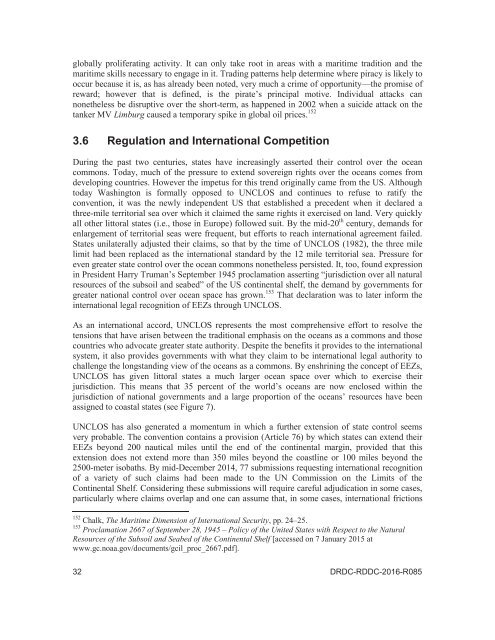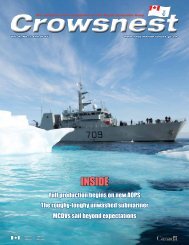Create successful ePaper yourself
Turn your PDF publications into a flip-book with our unique Google optimized e-Paper software.
globally proliferating activity. It can only take root in areas with a maritime tradition <strong>and</strong> <strong>the</strong><br />
maritime skills necessary to engage in it. Trading patterns help determine where piracy is likely to<br />
occur because it is, as has already been noted, very much a crime <strong>of</strong> opportunity—<strong>the</strong> promise <strong>of</strong><br />
reward; however that is defined, is <strong>the</strong> pirate’s principal motive. Individual attacks can<br />
none<strong>the</strong>less be disruptive over <strong>the</strong> short-term, as happened in 2002 when a suicide attack on <strong>the</strong><br />
tanker MV Limburg caused a temporary spike in global oil prices. 152<br />
3.6 Regulation <strong>and</strong> International Competition<br />
During <strong>the</strong> past two centuries, states have increasingly asserted <strong>the</strong>ir control over <strong>the</strong> ocean<br />
commons. Today, much <strong>of</strong> <strong>the</strong> pressure to extend sovereign rights over <strong>the</strong> oceans comes from<br />
developing countries. However <strong>the</strong> impetus for this trend originally came from <strong>the</strong> US. Although<br />
today Washington is formally opposed to UNCLOS <strong>and</strong> continues to refuse to ratify <strong>the</strong><br />
convention, it was <strong>the</strong> newly independent US that established a precedent when it declared a<br />
three-mile territorial sea over which it claimed <strong>the</strong> same rights it exercised on l<strong>and</strong>. Very quickly<br />
all o<strong>the</strong>r littoral states (i.e., those in Europe) followed suit. By <strong>the</strong> mid-20 th century, dem<strong>and</strong>s for<br />
enlargement <strong>of</strong> territorial seas were frequent, but efforts to reach international agreement failed.<br />
States unilaterally adjusted <strong>the</strong>ir claims, so that by <strong>the</strong> time <strong>of</strong> UNCLOS (1982), <strong>the</strong> three mile<br />
limit had been replaced as <strong>the</strong> international st<strong>and</strong>ard by <strong>the</strong> 12 mile territorial sea. Pressure for<br />
even greater state control over <strong>the</strong> ocean commons none<strong>the</strong>less persisted. It, too, found expression<br />
in President Harry Truman’s September 1945 proclamation asserting “jurisdiction over all natural<br />
resources <strong>of</strong> <strong>the</strong> subsoil <strong>and</strong> seabed” <strong>of</strong> <strong>the</strong> US continental shelf, <strong>the</strong> dem<strong>and</strong> by governments for<br />
greater national control over ocean space has grown. 153 That declaration was to later inform <strong>the</strong><br />
international legal recognition <strong>of</strong> EEZs through UNCLOS.<br />
As an international accord, UNCLOS represents <strong>the</strong> most comprehensive effort to resolve <strong>the</strong><br />
tensions that have arisen between <strong>the</strong> traditional emphasis on <strong>the</strong> oceans as a commons <strong>and</strong> those<br />
countries who advocate greater state authority. Despite <strong>the</strong> benefits it provides to <strong>the</strong> international<br />
system, it also provides governments with what <strong>the</strong>y claim to be international legal authority to<br />
challenge <strong>the</strong> longst<strong>and</strong>ing view <strong>of</strong> <strong>the</strong> oceans as a commons. By enshrining <strong>the</strong> concept <strong>of</strong> EEZs,<br />
UNCLOS has given littoral states a much larger ocean space over which to exercise <strong>the</strong>ir<br />
jurisdiction. This means that 35 percent <strong>of</strong> <strong>the</strong> world’s oceans are now enclosed within <strong>the</strong><br />
jurisdiction <strong>of</strong> national governments <strong>and</strong> a large proportion <strong>of</strong> <strong>the</strong> oceans’ resources have been<br />
assigned to coastal states (see Figure 7).<br />
UNCLOS has also generated a momentum in which a fur<strong>the</strong>r extension <strong>of</strong> state control seems<br />
very probable. <strong>The</strong> convention contains a provision (Article 76) by which states can extend <strong>the</strong>ir<br />
EEZs beyond 200 nautical miles until <strong>the</strong> end <strong>of</strong> <strong>the</strong> continental margin, provided that this<br />
extension does not extend more than 350 miles beyond <strong>the</strong> coastline or 100 miles beyond <strong>the</strong><br />
2500-meter isobaths. By mid-December 2014, 77 submissions requesting international recognition<br />
<strong>of</strong> a variety <strong>of</strong> such claims had been made to <strong>the</strong> UN Commission on <strong>the</strong> Limits <strong>of</strong> <strong>the</strong><br />
Continental Shelf. Considering <strong>the</strong>se submissions will require careful adjudication in some cases,<br />
particularly where claims overlap <strong>and</strong> one can assume that, in some cases, international frictions<br />
152 Chalk, <strong>The</strong> <strong>Maritime</strong> Dimension <strong>of</strong> International Security, pp. 24–25.<br />
153 Proclamation 2667 <strong>of</strong> September 28, 1945 – Policy <strong>of</strong> <strong>the</strong> United States with Respect to <strong>the</strong> Natural<br />
Resources <strong>of</strong> <strong>the</strong> Subsoil <strong>and</strong> Seabed <strong>of</strong> <strong>the</strong> Continental Shelf [accessed on 7 January 2015 at<br />
www.gc.noaa.gov/documents/gcil_proc_2667.pdf].<br />
32 DRDC-RDDC-2016-R085




